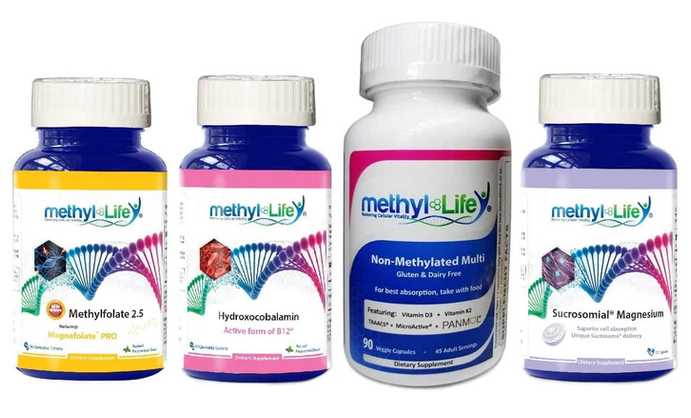Since the release of active forms of vitamin B12 and folate in dietary supplements on the market, there has been a rising debate about methylated vs. non-methylated multi-vitamins. Some people choose methylated supplements over non-methylated ones and vice versa. However, the question is how both differ and what non-methylated multi-vitamins are used for.
Please read through to learn about some common differences between the both. Also, we have mentioned the uses of non-methylated dietary supplements.
Non-methylated vs. Methylated Multi-vitamins
Methylated multi-vitamins usually contain methylcobalamin and methylfolate, the active forms of vitamin B12 and B9, respectively. In addition to performing their functions like forming RBCs and DNA, developing brain and nerve cells, regulating energy metabolism, helping in cells growth, and breaking down homocysteine, they speed up the methylation process for people with slow methylation pathways, the MTHFR gene variations, and high levels of homocysteine.
On the other hand, some people react sensitively to methylated multi-vitamins and showcase adverse side effects. If you experience the following effects after taking methylated nutrients, it indicates that it doesn’t suit your body:
- Headaches
- Increased heartbeat
- Nervousness
- Uncomfortable excitation
Such effects may take a few days to subside and cause discomfort. Contact a healthcare professional to confirm whether methylation is rooting these symptoms or not. If yes, then switch to methyl-free alternatives instead of taking your daily B vitamin without unease.
Uses of Non-Methylated Multi-vitamins
If you are looking for non-methylated supplements or multi-vitamins, look for the alternatives that are labeled as:
- Methyl-free
- MF
- Free from methyl
Methyl-free multi-vitamins work exactly like methylated ones because our body can convert them into the active form. However, it takes a few additional enzyme steps before changing them into methyl donors. But, they don’t overwhelm your body with agitating side effects.
MF multi-vitamins function similarly to the regular multi-vitamins and work to actively provide vitamins that are not consumed through diet. Also, methyl-free multi-vitamins treat vitamin deficiencies caused by certain digestive disorders, pregnancy, poor nutrition intake, and illnesses.
Methyl-free vitamin B9 (folate) and vitamin B12
Most non-methylated multi-vitamin contains methyl-free forms of vitamin B12 hydroxocobalamin or adenosylcobalamin, and vitamin B9 is folic acid because, till now, researchers have obtained non-methylated form of these B complex vitamins. Together they both work to produce healthy energy by assisting protein digestion and human metabolism. In addition, they boost the immune system, building a solid defense mechanism against ailments.
Non-methylated B12 and B9 also work to:
- Support mental health, hormone production, and methylation
- Reduce fatigue and tiredness
- Reduce levels of homocysteine in the blood
- Produce red blood cells
- Facilitates cell repair
Can pregnant women take non-methylated multi-vitamins?
If you are expecting or lactating, consult your healthcare provider before consuming these MF dietary supplements because most methyl-free multi-vitamins contain niacin (vitamin B3), which may cause a flushing and tingling feeling on the face area. However, such reactions subside within a few hours.
Conclusion
In short, non-methylated multi-vitamins are an excellent alternative for people who experience adverse side effects from consuming methylated forms of vitamin B12 and B9 (folate). However, some ingredients like niacin in such multi-vitamin can cause minor side effects. Hence, consult your doctor before taking any multi-vitamins.

